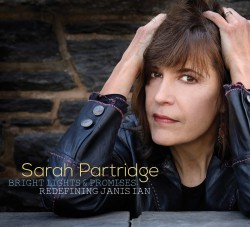MUSIC REVIEW BY Neil Tesser, Jazziz
When Janis Ian arrived in the 1960s as a teenaged singer-songwriter armed with an acoustic guitar, no one would have confused her with a jazz singer. She did have a precociously mature social consciousness--her first hit, "Society's Child," dealt with the establishment's disdain for interracial romance--and her biggest single, the chart-topping "At Seventeen," boasted a bossa nova beat and enough melodic content to elicit a cover from iconic bop saxophonist Phil Woods. But most of Ian's topical storytelling and pop-rock melodies have largely failed to interest jazz artists.
Enter Sarah Partridge, who grabbed nearly a dozen of Ian's tunes for this disc and, for good measure, wrote two new ones with Ian herself (who sings harmony on the swingy kiss-off song "A Quarter Past Heartache"). Partridge is one of jazz's better-kept secrets--a masterfully unsentimental singer whose vocal clarity and intelligent interpretations skip right past the merely pretty in order to locate harder truths and more rugged beauty. She uses these assets to mostly transform songs that challenge jazz interpretation: the melodies that contain Ian's extended narratives prove restrictive, even unyielding (as opposed to the looser flow of Partridge's own songwriting, unveiled on her 2015 disc I Never Thought I'd Be Here). But in those cases, Partridge and her musical director, pianist Allen Farnham, have wisely chosen not to force the issue, as on the title track, which slides by on roadhouse rhythms and suitably blowsy guitar licks.
And several of these arrangements manage to find a surprising middle ground between the material and Partridge's jazz bone fides, with a horn section led by multi-instrumentalist Scott Robinson smoothing the way. This material will never enter most jazz artists' repertoires. But at its most affecting--on such songs as "Tattoo," about an elderly concentration-camp survivor, or "Matthew," an homage to hate-crime victim Matthew Shepard--Partridge brings a jazz orientation to a harrowing message, a tradition stretching back to Billie Holiday's "Strange Fruit."
Enter Sarah Partridge, who grabbed nearly a dozen of Ian's tunes for this disc and, for good measure, wrote two new ones with Ian herself (who sings harmony on the swingy kiss-off song "A Quarter Past Heartache"). Partridge is one of jazz's better-kept secrets--a masterfully unsentimental singer whose vocal clarity and intelligent interpretations skip right past the merely pretty in order to locate harder truths and more rugged beauty. She uses these assets to mostly transform songs that challenge jazz interpretation: the melodies that contain Ian's extended narratives prove restrictive, even unyielding (as opposed to the looser flow of Partridge's own songwriting, unveiled on her 2015 disc I Never Thought I'd Be Here). But in those cases, Partridge and her musical director, pianist Allen Farnham, have wisely chosen not to force the issue, as on the title track, which slides by on roadhouse rhythms and suitably blowsy guitar licks.
And several of these arrangements manage to find a surprising middle ground between the material and Partridge's jazz bone fides, with a horn section led by multi-instrumentalist Scott Robinson smoothing the way. This material will never enter most jazz artists' repertoires. But at its most affecting--on such songs as "Tattoo," about an elderly concentration-camp survivor, or "Matthew," an homage to hate-crime victim Matthew Shepard--Partridge brings a jazz orientation to a harrowing message, a tradition stretching back to Billie Holiday's "Strange Fruit."
Soundclips
Other Reviews of
"Bright Lights and Promises: Redefining Janis Ian":
Broadway Music World by Music News Desk
JazzTimes by Christopher Loudon
Cadence by Robert Rusch
Elmore Magazine by Annie Dinerman
CodecPrime by Barry Bassis
Music Republic Magazine by Simon Redley
Midwest Record by Chris Spector
All About Jazz by Dan Bilawsky
